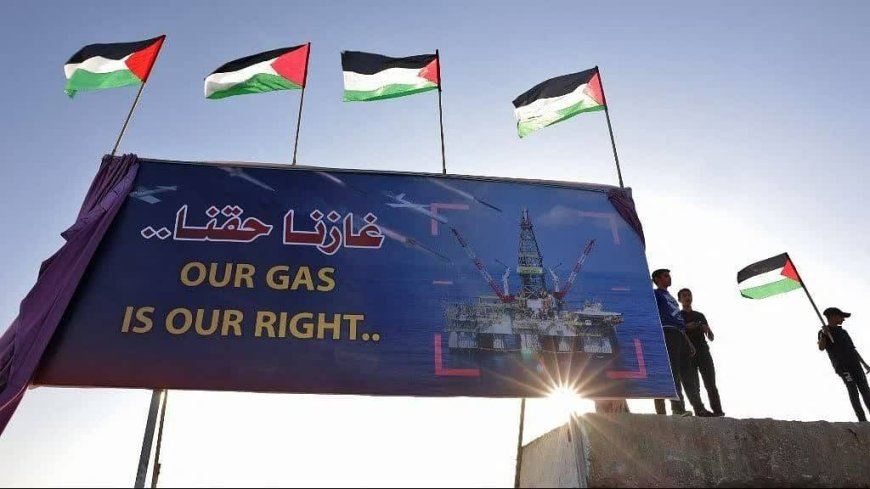The Gaza Gas Field: A Stolen Gem in the Eastern Mediterranean
In recent weeks, global financial leaders and international institutions have issued warnings regarding the deleterious impact of the Gaza war on the world’s economy. Concurrently, a crucial matter arising from the ongoing conflict in Gaza concerns its ramifications for the future of the region’s gas field, an aspect that has received limited attention from the media. The Gaza gas field, an essential resource in the Eastern Mediterranean, was discovered nearly two decades ago but has yet to be fully exploited due to political complexities and the occupation by the Israeli regime.

To begin, it is important to note that in 1995, the ignominious Oslo II was signed between the Palestine Liberation Organization (PLO) and the Israeli regime. This agreement marked the establishment of the Palestinian Authority and delineated the scope of its authority. However, despite the passage of nearly three decades since the signing of this treaty, the Palestinians continue to endure the political and security ramifications of this disastrous accord.
Under the terms of this treaty, various regions within the West Bank and the Gaza Strip were divided, with the Palestinians granted maritime rights only up to 20 nautical miles offshore. It was in accordance with these provisions that the Palestinian Authority entered into a 25-year gas exploration contract with the British Gas Group in 1999. Consequently, in 2000, two significant gas fields were discovered along the Gaza coast, boasting reserves of 1.4 trillion cubic meters, with approximately 60% of these reserves falling within Palestinian waters. Later, the former Israeli Prime Minister granted permission to commence drilling the first well under the auspices of the Palestinian Authority, thereby rendering Israeli intervention impossible based on their own laws and regulations.
However, the situation has since evolved, and in recent years, the vast, lucrative resources within these territories have been repeatedly violated. According to studies published by the United Nations Trade and Development Summit, the Gaza Strip and the West Bank house substantial oil and gas resources. These studies have also underscored the Israeli regime’s efforts to prevent the Palestinians from harnessing their natural resources.
Despite the successful military outcomes of Operation Al-Aqsa Storm carried out by the Palestinian resistance forces, Israel continues its brutal assault against Palestinian civilians, relentlessly bombarding the Gaza Strip, resulting in the ruthless deaths of over 16,000 children, women, and elderly civilians.
This marks a new phase in the Israeli regime’s annhilation campaign against the Palestinian nation. Over an extended period, the Israeli regime has inflicted billions of dollars in economic damages upon the Palestinian economy through the occupation of Palestinian territories and denying the Palestinians the opportunity to explore their abundant resources.
In fact, Palestine possesses billions of dollars worth of wealth and natural resources that could adequately meet the needs of its inhabitants. However, the presence of Israeli occupiers and their control over these resources, impeding their utilization, deprives the Palestinians of the benefits they rightfully deserve. The Minister of Economy for the Palestinian Authority recently emphasized that Palestinians suffer annual losses amounting to tens of billions of dollars due to the Israeli regime's occupation of the West Bank and Bait ul-Muqaddas [Jerusalem].
It is worth noting that a study conducted by the Applied Research Institute (ARIJ) estimates the annual losses resulting from direct and indirect Israeli presence in the Palestinian territories to be $9.46 billion. This study further highlights the Palestinians' losses, estimated at $2.63 billion annually, due to the Israeli regime's control over natural resources, including water, natural gas, oil, and agricultural lands.
For three decades, the Palestinian economy and the daily lives of its citizens have been profoundly influenced by the Oslo Accords and their appendices, subject to Israel's decisions, which have exerted strict control over all aspects of Palestinian existence. In addition to the litany of atrocities committed by the regime, it is imperative to acknowledge that Tel Aviv has shown no regard for the various agreements signed by its own former officials.
According to observers, Israel's first and foremost objective is to pillage all the natural and divinely bestowed resources of the Palestinians with the intention of joining the ranks of prominent gas and, subsequently, oil exporters. Over the past two decades, Israel has transformed from a mere gas importer to an exporter, and through the complete occupation of Gaza, it seeks to maximize the utilization of its natural resources. This flagrant display of occupation-driven nature by the Israeli regime is evident to the entire world.













































